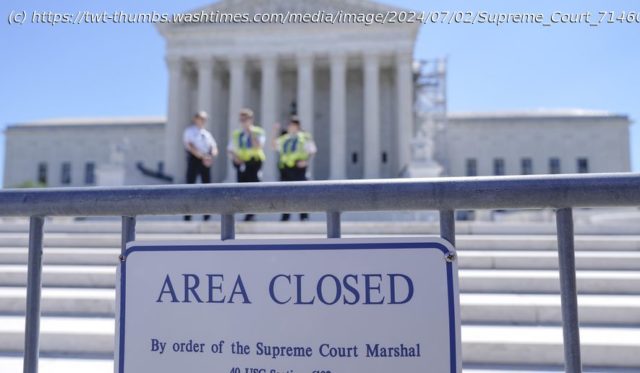Court watchers say the Supreme Court’s recently completed term featured several major disputes that will have lasting impact on the judicial and executive branches of government.
Court watchers from both sides of the political aisle say the Supreme Court’s recently completed term featured several major disputes that will have lasting impact on the judicial and executive branches of government.
But instead of listing the most significant cases, they pointed more generally to four main issues the justices grappled with, including disputes involving former President Donald Trump, abortion, gun control and the administrative state.
“This is really a blockbuster term — not only in terms of how much impact the court had in particular areas, but how many areas that they did work in,” said Elliot Mincberg, senior fellow at People For the American Way.
“It was a very consequential Supreme Court term, so it’s hard to choose the handful of cases with the most significant impact,” said Curt Levey, president of the Committee for Justice.
Trump
Probably the high court’s most consequential case dealt with whether a former president enjoys absolute immunity from prosecution for actions taken in office. The dispute was brought by Mr. Trump, who challenged special counsel Jack Smith’s criminal charges over his efforts to overturn the results of the 2020 election.
Mr. Trump argued that presidents enjoy absolute immunity from prosecution, but the justices did not adopt that broad argument.
Instead, in a 6-3 ideologically divided ruling on the court’s last day of the 2023 term, the justices said presidents enjoy absolute immunity for actions taken under their core duties and are presumed to have immunity from criminal prosecution for other behavior. But the justices said a president is not entitled to immunity from prosecution for unofficial acts.
The ruling wasn’t an out-and-out win for Mr. Trump, as it sent directives to a lower court on how to weigh his official versus unofficial conduct in an indictment from Mr. Smith.
Still, the ruling is likely to delay pending trials against Mr. Trump beyond Election Day.
Earlier this year, the justices in a unanimous ruling declined to remove Mr. Trump from the Colorado ballot after a state court had said he was barred due to the U.S. Capitol attack on Jan. 6, 2021.
Critics had said the former president was ineligible to have his name appear on the ballot because of the Constitution’s Insurrection Clause, which says anyone who participated in a rebellion is barred from holding public office.
Section 3 of the 14th Amendment, the clause at issue, reads: “No person shall be a Senator or Representative in Congress, or elector of President and Vice-President, or hold any office, civil or military, under the United States, or under any State, who, having previously taken an oath, as a member of Congress, or as an officer of the United States, or as a member of any State legislature, or as an executive or judicial officer of any State, to support the Constitution of the United States, shall have engaged in insurrection or rebellion against the same, or given aid or comfort to the enemies thereof.
Home
United States
USA — mix Supreme Court term focused on Trump, abortion, guns and administrative state






